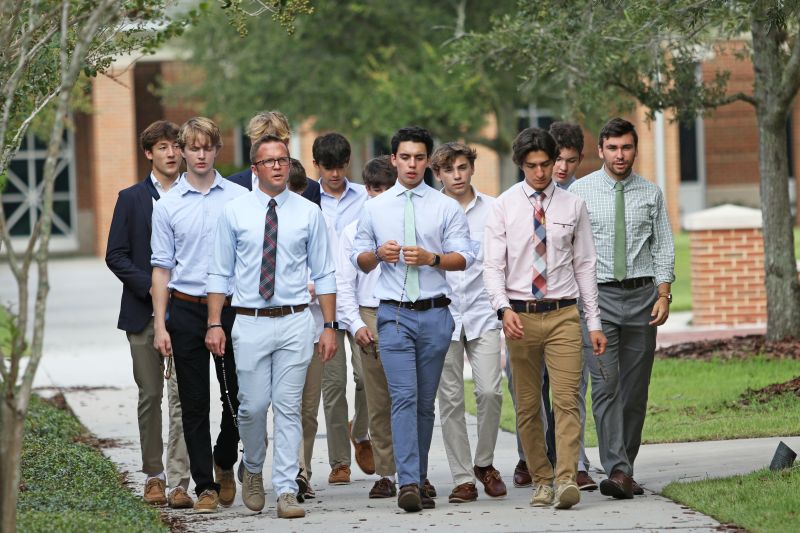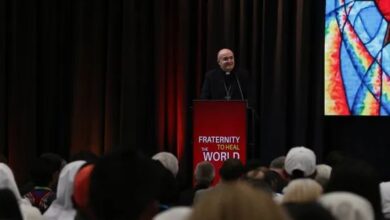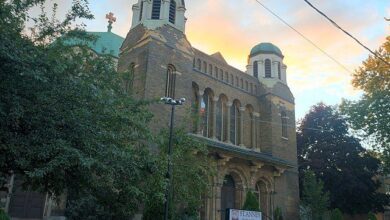Holy friendships continue to transform all-boys Catholic high school in Tampa
 Jimmy Mitchell (front row, far left) leads a group of Jesuit High School students in Tampa, Florida, in a walking rosary after school. / Credit: Jesuit High School
Jimmy Mitchell (front row, far left) leads a group of Jesuit High School students in Tampa, Florida, in a walking rosary after school. / Credit: Jesuit High School CNA Staff, Sep 23, 2023 / 07:00 am (CNA).
Broadly speaking, it would be an understatement to say that the young men at Jesuit High School in Tampa, Florida, are good at sports. Buoyed by numerous state championships in recent years, the school was recently voted the top sports school in the entire Sunshine State.
That competitive and excellence-seeking nature lends itself to a different kind of zeal, however — a zeal to bring souls to Jesus Christ.

Jimmy Mitchell, director of campus ministry at Jesuit and author of the new book “Let Beauty Speak,” told CNA that the “competitive nature of school” not only lends itself to great sports — and great academics — “but in a really cool way they can also, maybe not get competitive, but certainly ambitious when it comes to souls.”
Because of the school’s emphasis on peer-to-peer Catholic ministry, the young men at the school are encouraged to turn their talents and efforts toward the sharing of the faith with their classmates — and similar to their sports teams, the men of Jesuit have found success.

Coming off the disruptions wrought by COVID-19, Jesuit High School had 22 students convert during the 2020-2021 school year through its RCIA program — an unprecedented number that both continued and elevated a trend.
Since 2010, a total of 104 students have been baptized and received into the Church at Jesuit, Mitchell reported. Fifty-seven of those were during the last three school years alone, and 33 of those converts are current students on campus, he said.
Mitchell said as a campus minister, his goal is “a kind of personal care and personal approach to every student, like they’re the only person on planet Earth.”
“If we can catch them young and love them better than anybody else, it’s going to have a massive impact,” Mitchell said.
‘A brotherhood with eternal consequences’
Father Richard Hermes, SJ, now president of the school for over a decade and a half, told CNA that there’s “nothing more important” to him and to the school than promoting the faith and leading the young men to God.
“The boys are working hard in school and teachers are doing a great job, and the kids are having a lot of success on the field. But there’s also, in the middle of it, this great thing happening in terms of spiritual renewal,” Hermes told CNA.

Retreats, whether abroad or closer to home, are a big part of the school’s ministry to the students. In 2021 the school brought a group of over 100 young men on a pilgrimage to Europe that coincided with the 500th anniversary of St. Ignatius’ conversion and the 400th of his canonization. (The school provides scholarship assistance to allow students of all financial backgrounds to go on the retreats.) This year a large group of students went to Lourdes.
“I think all of that really solidifies a lot of guys in their faith [and] helps guys open up to the faith. It produces converts, too,” Hermes said.
Mitchell previously told CNA that a key factor in the campus’ “dynamic, orthodox, authentically Catholic culture” is the availability of the sacraments. Mass is offered daily, along with regular Eucharistic adoration and opportunities for confession.
The school itself seeks to emphasize beauty, Mitchell said, with the crown jewel being the multimillion-dollar Holy Cross Chapel, a Romanesque edifice dedicated in 2018. Hermes said the school prizes “beautiful, noble, dignified liturgies … trying to create an atmosphere of prayer and make the Masses and the other liturgical services as dignified and solemn as you can.”
But beauty can only do so much on its own. It’s the face-to-face, brotherly support that makes the difference when it comes to producing converts, Mitchell said.
“This is a brotherhood with eternal consequences. With eternal significance,” he said.

‘Wherever I looked, I could see witnesses to the faith’
Diego Mejia, a Jesuit senior and president of peer ministry, told CNA before arriving at the school, despite being introduced to the faith by his parents at a young age, he did not consider himself Catholic and had “no understanding” of the Catholic faith.
That said, Mejia said he had always been inspired by people who gave themselves entirely to their causes, whether it be a doctor fighting to cure diseases, or an environmentalist fighting for what he or she believed in. He says he found many such people at Jesuit, giving themselves wholly over to their belief in Christ.
“Jesuit did everything for me with bringing me back to the faith, which my parents had introduced me to when I was in elementary school, but which I had strayed away from when I was in middle school,” Mejia said.
“I saw people just wholeheartedly giving themselves over to this faith that they had found and to the life that the faith proposes for them.”

At Jesuit, groups of eight to 10 students convene regularly during lunch periods to discuss their faith, engaging in vulnerable conversations about their struggles and sharing wisdom and counsel with each other.
Mejia said the school’s peer ministry groups were a key factor in his eventual intellectual embrace of the faith — complimenting what he was learning in theology class — as well as the fostering of an environment where he felt supported in his faith by his peers.
“Discipleship created this environment for me where I’d come in during lunch with my friends and we just have conversations. And simply by reflecting on where we stood in our own faiths and hearing testimonies from one another, and then also in discussing different topics and different things related to the faith, I was able to really grow in my own faith,” he explained.
“And I was able to take what I learned in my theology class and bring it then into my heart … Wherever I looked, I could see witnesses to the faith. And these witnesses inspired me.”
Jake Killian, a fellow senior and student body president, told CNA that despite being raised Catholic, his faith was more of a “Sunday thing” than an integral part of his life. But arriving at Jesuit changed his outlook.
“Once I got to Jesuit, it turned from a once a week thing on Sunday to a true, actual relationship,” he said.
“I learned so many different ways to pray, and one of my favorite ones was probably Liturgy of the Hours … so many opportunities on campus to be formed.”

Killian said one of the reasons for this was simply the emphasis that the school puts on faith formation. He, too, spoke about how the yearly retreats have impacted him, mentioning the seriousness with which the retreats are treated, as a special and privileged time to build friendships and deepen faith.
“It’s pretty hard to ‘miss’ the faith. Our chapel is literally right in the middle of campus, and it’s an incredible environment … [but] it’s not forced on kids. I feel like you’ve got to buy into it, but with the culture on campus, it’s kind of hard not to,” he said.
The 17-year-old Killian said at this time in his life, he wants to go to college, possibly to play soccer. He said he has come to understand the importance of finding and joining a Catholic community in college, in order to not lose what he has cultivated at Jesuit.
“The thing I hear a lot is that if you’re able to make it to Mass the first week [of college], that’s a huge first step, because usually when kids don’t make it to Mass their first week in college, they don’t really find a time to go, ever,” he said.
Mejia said he is still discerning his next steps, mulling over religious vocations as well as various options for college. He says he’s seen firsthand at Jesuit how important brotherly accountability is to maintaining the faith and plans to continue seeking out that accountability while in college and beyond.
“I myself and many of my friends have learned that if we’re going to continue our faith in college and thereafter, we’ll have to find other like-minded people with whom we can pursue our faith … [and] I’ll have to continue growing my intellect, and my understanding of the faith and reasoning at every step of the way so that I can continue on believing and adhering to the doctrine which our faith lays out.”
Mitchell commented that forming the young men to be strong in their faith after they leave Jesuit and enter the wider community is a major focus.
“Even young people are coming from rock-solid Catholic homes, devout parents, great parishes — if at a certain point they don’t start to see the faith lived out in really cool and attractive ways, especially by their friends, it’s really challenging for them to stay committed to that faith in college and beyond,” he noted.

Hermes further confirmed that teaching the students how to live as solid Catholic men in a collegiate atmosphere is an “important part of our mission.” Amid what Hermes sees as a scourge among young people comprising “a general collapse of faith, the affliction of pornography, mental anxiety, mental depression, mental health issues,” Hermes said the school takes care to attend to the students’ mental health along with their spiritual health. And the results have been positive.
“We’re seeing more and more of these guys becoming leaders in the Church, whether in college, during their college years, or beyond. They’re making a real impact on the Church,” Hermes said.
“They’re leaving here with a mentality of being at the service of the Church, and [their faith’s] not just dying here after they get the diploma.”
‘Unapologetic and uncompromising’
Perhaps surprisingly, although there will always be a few students who don’t ultimately embrace the faith, most of the young men who come into the school as non-Catholics “don’t really come fighting the faith too much,” Hermes said.
“Most of our students come here either without any knowledge of the faith or without any experience of it, and relatively little practice of it,” he explained.
“So just introducing them to God and to the Catholic Church, to the Lord Jesus, to the sacraments, to Sunday Mass, confession, Eucharistic adoration, that’s obviously a challenge both in the theology classroom and then in retreats and campus ministry.”

The school features a “rock-solid theology department” that aims to provide truth combined with “unapologetic and uncompromising” love, Mitchell said. Teachers at the school can and do set an example of true devotion, Mitchell said, spending time on their knees at the adoration chapel, modeling prayer and faith for the young men.
“The deeper [the teachers’] interior lives run … the more the pursuit of holiness is sort of normalized … the more accessible it seems to everybody, you know?” he said.
Mitchell said he has heard about other schools starting RCIA programs and hiring full-time campus ministers, seeking to replicate Jesuit’s success. But Mitchell said it is vital to recognize that conversions and deepening of faith are really the Lord’s work — it’s always at his initiative that a person comes to believe.
The students at Jesuit appear to have bought into the idea of cooperating with God’s plan to bring more people into the Church.
“There’s a desire, I think, among many of our student leaders in this particular senior class to use their platform, if you want to call it that, to use their influence, to use their leadership ultimately for God’s glory and for the salvation of souls,” Mitchell said.





